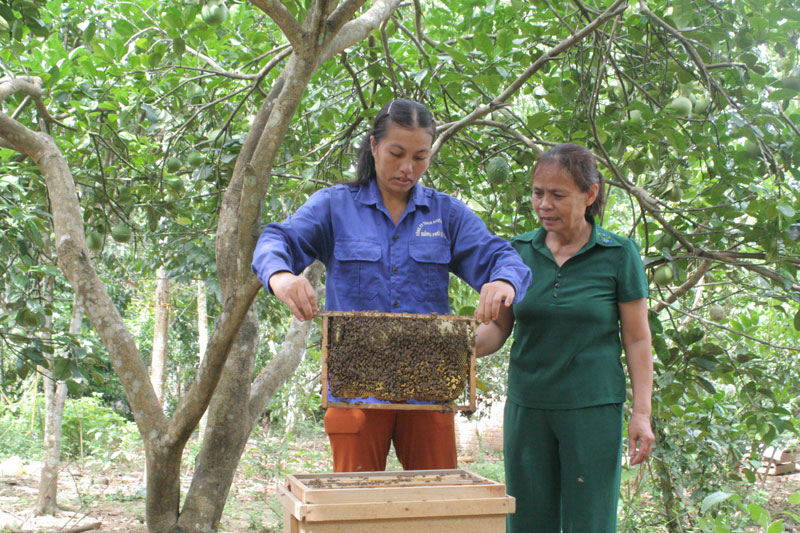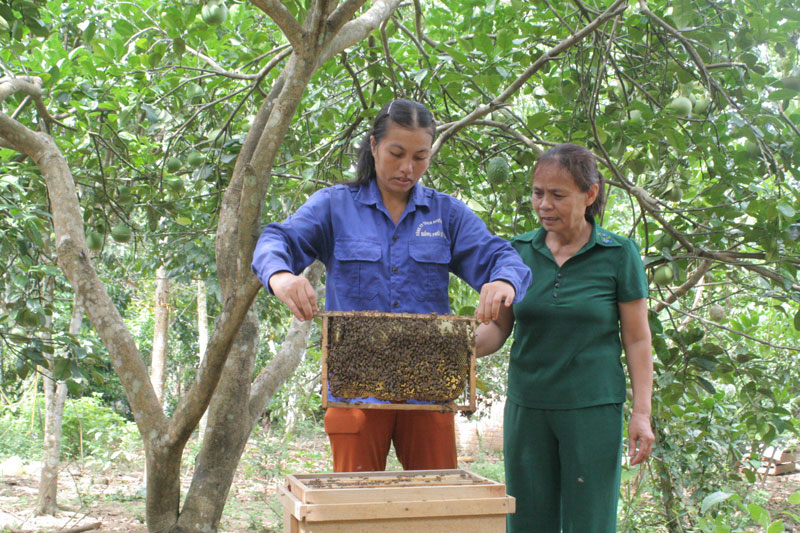
(HBO) - Taking us to see the model, Ms. Nguyen Thi Huong, a supporting agricultural and forestry staff of Mong Hoa commune (Ky Son district) said: The commune has 12 hamlets, most of the hamlets are close to the hill so the model of raising bees for honey was quite suitable for practical conditions.

Ms. Nguyen Thi Thuy’s family, Vanh hamlet,
Mong Hoa commune (Ky Son) were bee circulated by poor households in the project
to replicate the model of reducing poverty.
Mr. Nguyen Van Ha, Bai Sau hamlet confided:
My family has 6 people with only 1.300 m2 of rice fields and small area of
sugarcane plantation. In 2017, being selected to participate in the model of
raising bees for honey, I was very happy. The family was supported 8 bee tanks.
At this time, the family has collected more than 60 liters of honey; the
average selling price was 200,000 VND / liter, earning over 12 million VND. At
present, the family has developed 3 herds and transferred one herd for the poor
household of Mr. Nguyen Van Binh in Vay village. Thanks to participating in the
model, in 2017, my family totally escaped from poverty.
In Vanh village, Ms. Nguyen Thi Thuy's family
is a poor household of the commune. Ms. Thuy's family had only 500 m2 of rice
fields, 300 m2 of vegetable fields. She and her husband’s working in the field
is not enough to raise two children to study. More than a month ago, the family
has been involved in the model of raising bee for honey since 2017and was
transferred 2 bee tanks. Ms. Thuy said: Being shared the new way by the poor,
near poor families will be the motivation to help my families increase our
income and gradually stabilize our lives.
The project for replication of the poverty
reduction model by "raising bees for honey" in Mong Hoa commune is
supported by the National Targeted Program for Sustainable Poverty Reduction in
2017. In October 2017, the project was implemented in the area with 45 poor and
near poor households to participate. Each household is provided with 6 bee
tanks and 1 million VND of supplies and facilities. The participating
households had to invest in the reciprocal bee tanks. In addition, when
participating in the model, the local people are required to develop rotational
bees for poor households, near poor households in the area. After 3 months of
implementation, bees began to turn honey. In the crops of Logan and litchi
blossom, some households get less than 7 liters, some with 12 liters of honey.
The current price in the market is stable at 200,000 VND / liter. Up to now,
the whole commune has developed more 15 households with the circulation of
bees.
According to data from the Hoa Binh Provincial Party Committee, the industrial production index for the first six months of 2025 is estimated to have increased by 20% compared to the same period last year. This marks the highest year-on-year growth rate for this period since 2020.
In the first six months of 2025, Hoa Binh province’s export turnover was estimated at 1.145 billion USD, marking an 18.11% increase compared to the same period in 2024. Import turnover was estimated at $ 804 million, a 17.15% increase, which helped the province maintain a positive trade balance.
The lives of the ethnic minority farmers in Tan Lac district have gradually improved thanks to the new directions in agricultural production. This is a testament to the collective strength fostered through the professional associations and groups implemented by various levels of the district’s Farmers’ Union.
With the motto the "product quality comes first,” after nearly one year of establishment and operation, Muong village’s Clean Food Agricultural and Commercial Cooperative, located in Cau Hamlet, Hung Son Commune (Kim Boi district), has launched reputable, high-quality agricultural products to the market that are well-received by consumers. The products such as Muong village’s pork sausage, salt-cured chicken, and salt-cured pork hocks have gradually carved out a place in the market and they are on the path to obtaining the OCOP certification.
In the past, the phrase "bumper harvest, rock-bottom prices" was a familiar refrain for Vietnamese farmers engaged in fragmented, small-scale agriculture. But today, a new spirit is emerging across rural areas of Hoa Binh province - one of collaboration, organisation, and collective economic models that provide a stable foundation for production.
Maintaining growing area codes and packing facility codes in accordance with regulations is a mandatory requirement for agricultural products to be eligible for export. Recently, the Department of Agriculture and Environment of Hoa Binh province has intensified technical supervision of designated farming areas and packing facilities to safeguard the "green passport" that enables its products to access international markets.



